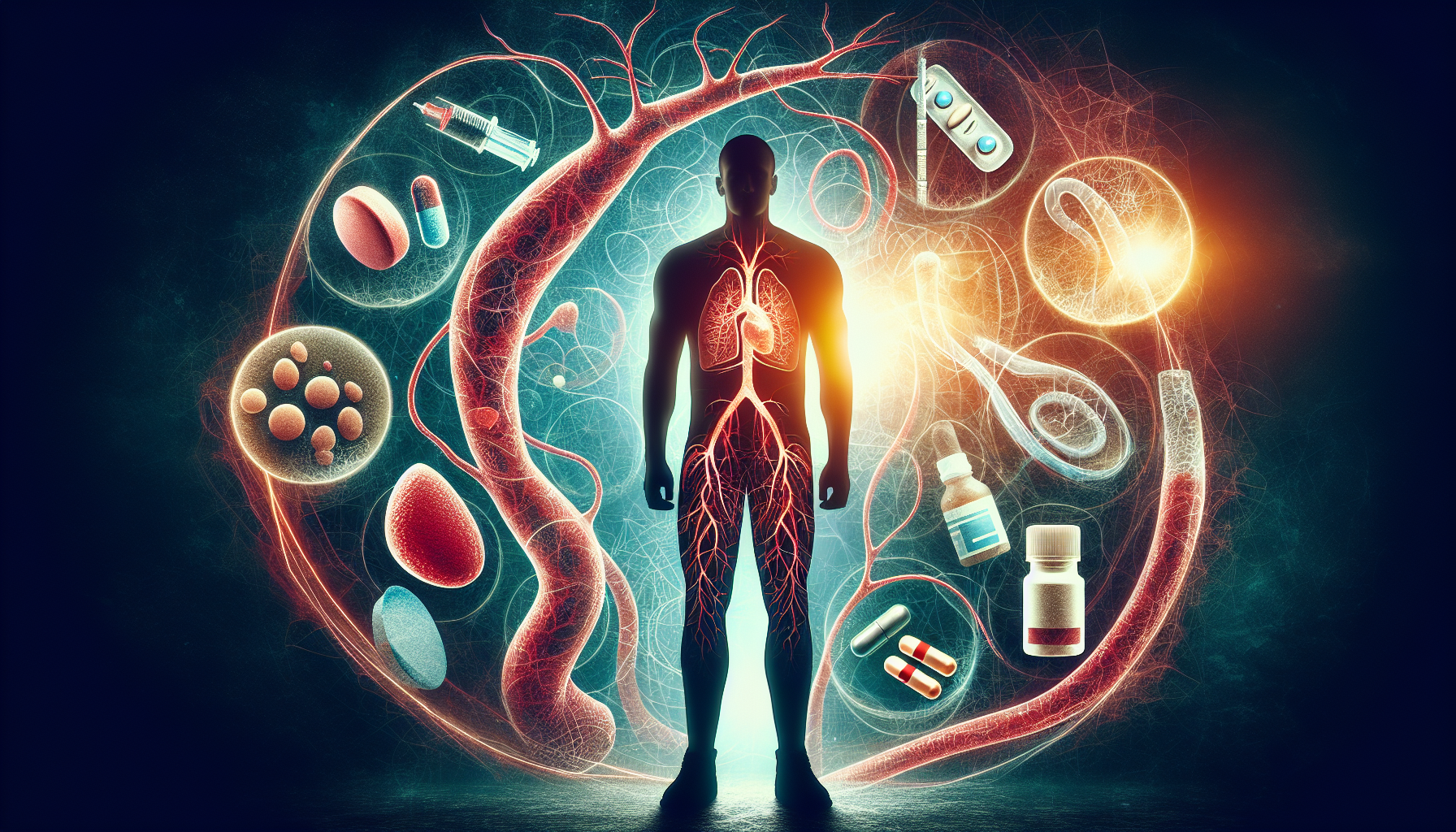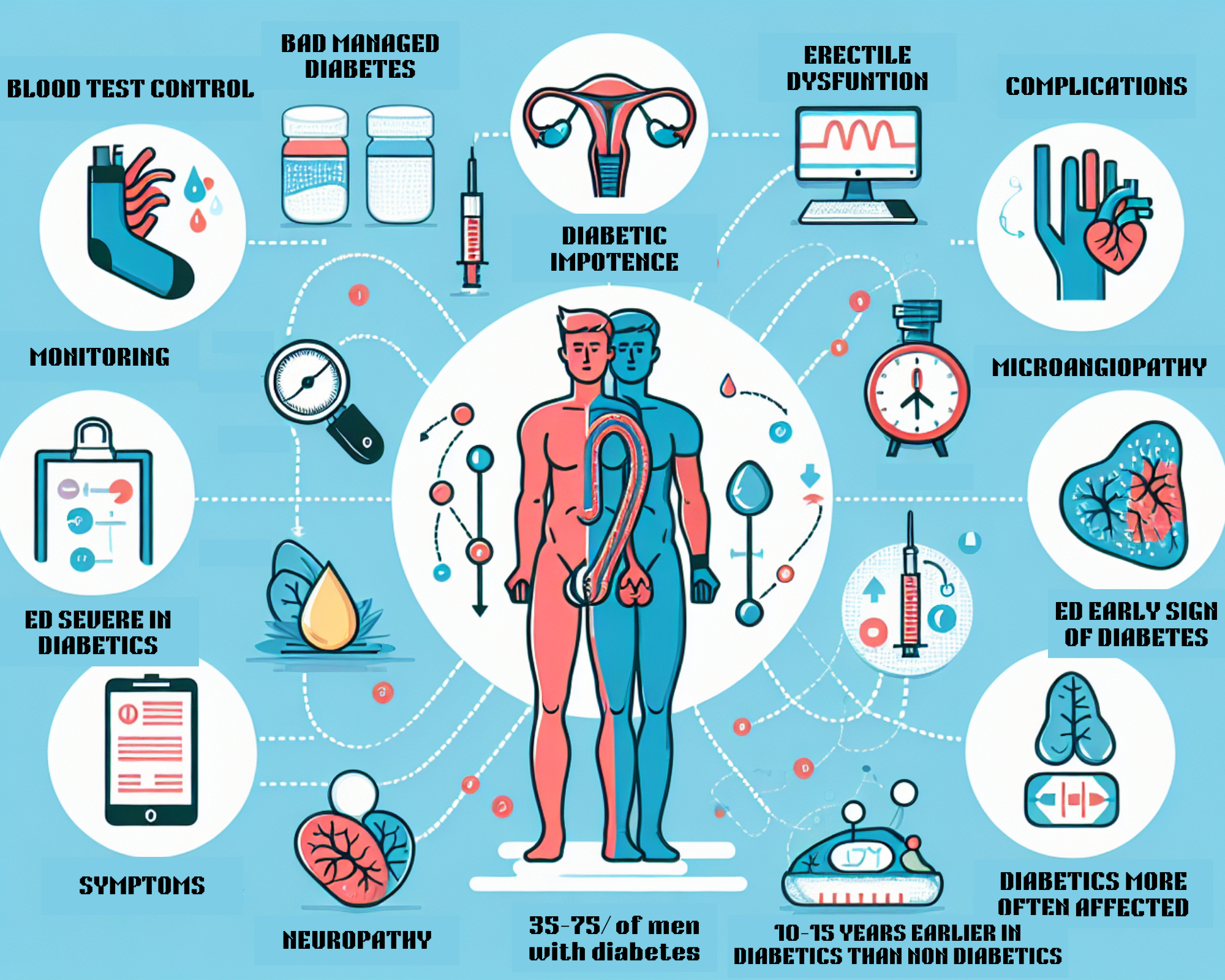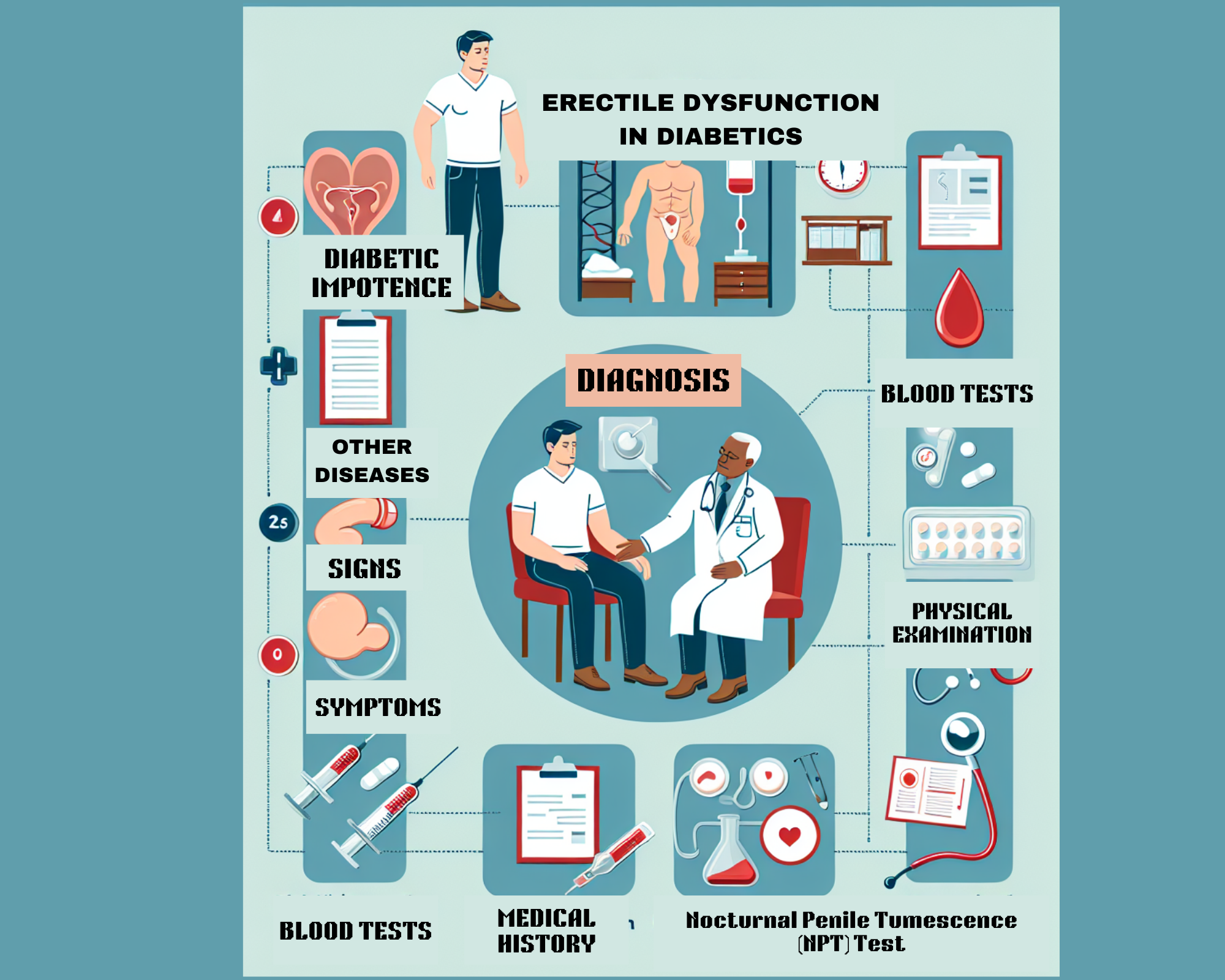Overcoming Diabetic Impotence and Erectile Dysfunction!
- Home
- Complications
- Diabetic Impotence treatment and cures to regain regular sexual life
Among the many difficulties associated with diabetes, impotence is one of the most upsetting complications. Unfortunately, this illness can deprive individuals of their capacity for fulfilling sexual performance, compounding the difficulties that diabetes already brings.
Relationship between Diabetes and Erectile Health
Throughout their lives, 35-75% of men with diabetes will struggle with erectile dysfunction to some extent. Compared to the general male population, this is almost three times as common.
Compared to males without diabetes, individuals with diabetes typically experience develop erectile dysfunction 10 to 15 years earlier.
Diabetic men's erectile dysfunction is frequently more severe and difficult to treat than non-diabetic males.
Both Type 1 and Type 2 diabetes can cause erectile dysfunction, but Type 2 is more common due to its higher prevalence. In some cases, erectile dysfunction is considered an early sign of diabetes, especially in men who haven't been diagnosed yet. Men with poorly controlled diabetes are more likely to develop erectile dysfunction than those with well-controlled diabetes.
The longer a man has diabetes, the greater the risk of developing erectile dysfunction. Men with poorly controlled diabetes have a higher risk compared to those with well-managed blood sugar levels.
Erectile dysfunction in diabetics is frequently related with other issues such as cardiovascular disease, neuropathy, and high blood pressure, all of which can worsen the illness.
Erectile dysfunction can have a substantial impact on diabetic men's mental health and quality of life, increasing the likelihood of sadness and anxiety.
Diabetic males with erectile dysfunction may respond less well to traditional ED medications such as phosphodiesterase type 5 (PDE5) inhibitors (e.g., Viagra, Cialis) than non-diabetic men.
Diabetic Impotence Causes & Symptoms
Diabetic impotence arises from a complex interplay of factors.
There are a lot of theories going on that explain why people suffering from diabetes can develop erectile dysfunction much easier than non-diabetics.
There are two main theories for the development of impotence in diabetes, including:
1. Microangiopathy: This is very common in diabetes, and that’s why not only the blood vessels in the penis are damaged but the blood vessels in many other organs, too.
Diabetes damages the blood vessels in the penis, preventing them from filling with blood when the person is aroused. This prevents erection, leaving the penis in its normal condition.
Erection is a term used to describe the enlargement of the penis because of increased blood flow towards it. However, if there is no blood flow, erection will not be possible.
2. The second theory that has even more supporters is the theory of autonomic neuropathy. The nerves that are a part of the body's autonomic nervous system perform the process of erection rather than the brain.
Diabetes damages the autonomic nervous system, and that’s why control over erection is lost. Impotence in diabetics is a result of losing nervous control of the nerves that are responsible for the erection.
That’s why erectile problems do not come alone; they come with all the problems that are associated with autonomic neuropathy. This is strong support for this theory.
The symptoms of impotence in diabetics are common. You are not able to get an erection even if you feel that you are aroused. Sweating, tachycardia (increased heart rate), or bradycardia (decreased heart rate) may accompany this.
Furthermore, people with erectile dysfunction could have lost their sensitivity to the penis. This contributes to erectile dysfunction.
Diagnosis of Erectile Dysfunction in Diabetics
Diagnosing diabetic impotence (erectile dysfunction in diabetes) involves several steps in order to gather enough information. In this way, an appropriate treatment plan is tailored to your needs.
The diagnosis process includes the following tools:
Medical History: Please report all the symptoms you have to your doctor, when was the first time you were diagnosed with diabetes, and the treatment you're currently taking.
Physical Examination: A physical exam will be conducted to assess your genital area for any structural abnormalities and to check nerve sensation.
Blood Tests: These may include tests to measure your blood sugar levels (to confirm diabetes control), lipid profile (cholesterol levels), and hormone levels (especially testosterone).
Nocturnal Penile Tumescence (NPT) Test: This test monitors erections that occur during sleep, which can help determine if the cause of ED is physical or psychological.
Other Tests: Depending on your specific situation, your doctor may recommend additional tests such as ultrasound to assess blood flow to the penis or other specialized tests to evaluate nerve function and vascular health.
Treatment options for diabetic impotence
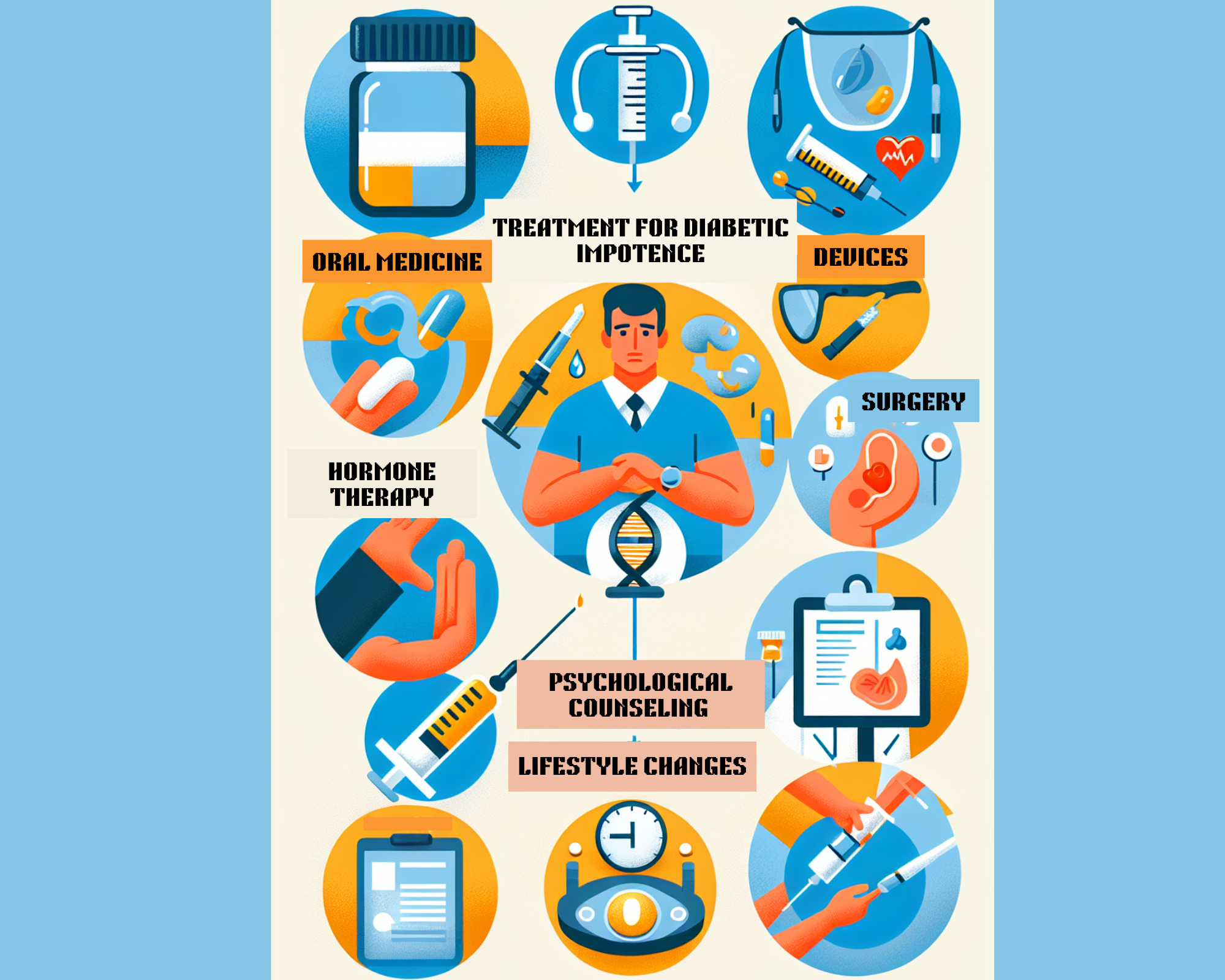
Choosing the right treatment often involves a combination of approaches tailored to the current health situation.
Effective treatments for diabetes-related impotence include:
Oral Medicine: There are lots of medicaments that could help improve the condition, but they will not cure the patients. Peripheral vasodilators, which will improve blood circulation in your penis, are a weapon of first choice when a person has erectile dysfunction.
Drugs like sildenafil (Viagra), tadalafil (Cialis), or vardenafil (Levitra) are often prescribed to enhance blood flow to the penis, facilitating erections. These medications are typically effective for many men with diabetes-related ED; however, due to their side effects, they are not recommended for longer periods.
Hormone therapy: In addition, if testosterone levels are low, hormone replacement therapy may be recommended to improve libido and erectile function.
Lifestyle changes for erectile dysfunction in diabetics: Managing diabetes through diet, exercise, and maintaining a healthy weight can improve overall health and reduce ED symptoms. Lifestyle adjustments may also include quitting smoking and moderating alcohol consumption.
Regular aerobic exercises like brisk walking, jogging, or cycling improve blood flow and cardiovascular health, which is crucial for managing erectile dysfunction in diabetes.
Strength training exercises, such as weightlifting, can also help boost testosterone levels. Combined with a healthy diet and weight management, exercise can significantly enhance erectile function in diabetic men.
Psychological Counseling: Addressing stress, anxiety, or depression that may contribute to ED can be beneficial. Counseling or therapy can help manage these psychological factors and improve sexual function.DS
Devices and Surgeries: Options include vacuum erection devices, which use suction to draw blood into the penis, or penile implants, which are surgically placed to allow for erection when desired. Vascular surgery may also be considered in cases where the blood flow to the penis is severely restricted.
Diet tips for managing erectile dysfunction with diabetes
Managing erectile dysfunction (ED) with diabetes involves maintaining a healthy diet that supports cardiovascular health and blood sugar control.
Here are some diet tips:
Encourage people to consume whole foods. Eat plenty of fruits, vegetables, whole grains, and lean proteins to provide essential nutrients and fiber.
Limit refined sugars and carbohydrates: minimize intake of sugary beverages, desserts, and processed foods to help control blood sugar levels.
Choose healthy fats: Opt for sources of unsaturated fats such as nuts, seeds, avocados, and fatty fish like salmon to support heart health.
Control portion sizes: Monitor portion sizes to prevent overeating, which can contribute to weight gain and worsen diabetes management.
Eat regularly: Maintain consistent meal times and include snacks if needed to help regulate blood sugar levels throughout the day.
Monitor sodium intake: Limit salt and high-sodium foods to help manage blood pressure and reduce the risk of cardiovascular complications.
Stay hydrated: Drink plenty of water to support overall health and ensure proper hydration, which is essential for circulation.
Moderate alcohol consumption: Limit alcohol intake, as excessive drinking can contribute to ED and interfere with diabetes management.
Natural Remedies for Diabetic Impotence
can complement medical treatments and lifestyle changes.
Herbal Supplements:
- Panax Ginseng: Some studies suggest that ginseng may improve erectile function in men with diabetes by promoting nitric oxide production and improving blood flow.
- L-arginine: This amino acid is a precursor to nitric oxide, which helps relax blood vessels and improve blood flow to the penis. Consult with a healthcare provider before supplementing, especially if taking medications.
- Other supplements, like vitamin D and magnesium, may support erectile function in some cases.
Acupuncture: Acupuncture may help improve erectile function by stimulating nerves and improving blood flow.
Yohimbe/Yohimbine: Derived from the bark of an African tree, yohimbe has been used traditionally to improve sexual function. However, it can have significant side effects and interactions with medications, so it should be used cautiously and under medical supervision.
Stress management techniques for diabetic impotence
Stress management is crucial for improving erectile function in diabetic men. There are some practical techniques that can significantly reduce stress levels and improve erectile function when practiced regularly.
Some of them include:
Mindfulness meditation reduces stress and enhances relaxation, improving overall mental health.
Deep breathing exercises promote relaxation and reduce anxiety, helping to alleviate erectile dysfunction.
Progressive muscle relaxation relieves muscle tension and promotes a sense of calm.
Yoga: Combines physical postures, breathing exercises, and meditation to reduce stress and improve circulation.
Regular exercise: Aerobic activities like walking or swimming can reduce stress and improve overall cardiovascular health, benefiting erectile function.
Healthy lifestyle: Eating a balanced diet, getting enough sleep, and avoiding excessive alcohol and tobacco use can also help manage stress and improve erectile function.
These techniques, when practiced regularly, can significantly reduce stress levels and improve erectile function in men with diabetes.
The Best ways to prevent impotence in diabetics
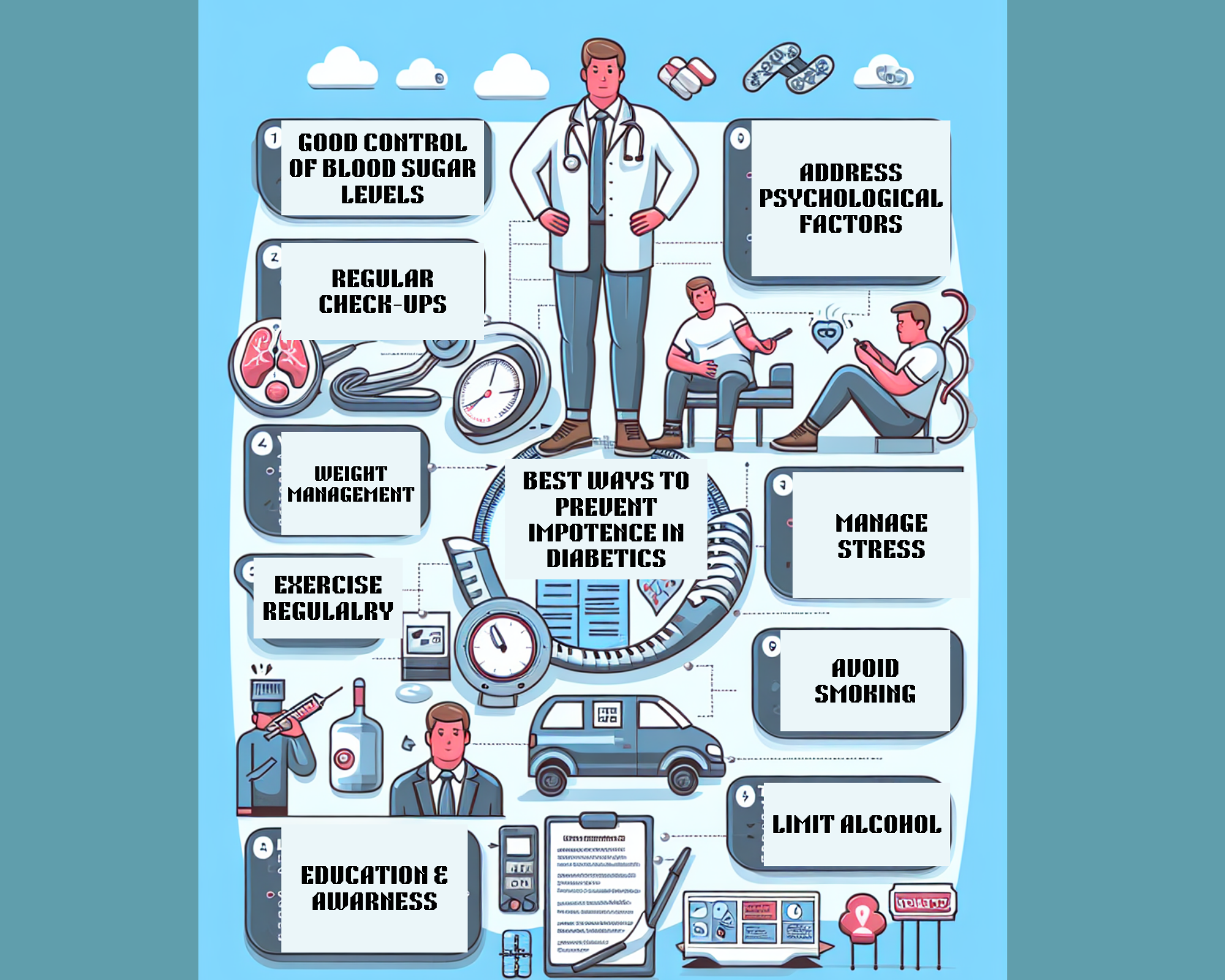
Preventing impotence (erectile dysfunction) in diabetics involves managing blood sugar levels, maintaining overall health, and adopting a healthy lifestyle.
Following, I will try to describe the best ways to prevent impotence in diabetics:
Maintain control over blood sugar levels by regularly checking them, taking the medications your compassionate doctor has prescribed, and adhering to a diabetes-friendly diet.
Exercise regularly: include aerobic exercise (at least 150 minutes of moderate-intensity aerobic exercise per week) and strength training exercises (at least two days a week) to improve overall health and blood circulation.
Weight Management: Achieve and maintain a healthy weight through diet and exercise, as excess weight can contribute to insulin resistance and ED.
Avoid smoking because smoking damages blood vessels and can exacerbate ED.
Limit alcohol consumption, as excessive alcohol can impair erectile function. Stick to moderate drinking guidelines.
Manage stress through relaxation techniques and developing effective time management skills to reduce stress from daily activities.
Regular check-ups involve keeping regular appointments with your healthcare provider to monitor and manage diabetes and other health conditions. Get regular screenings for cardiovascular health, as heart disease and high blood pressure can affect erectile function negatively.
Address psychological factors through counseling or therapy to address any psychological issues such as anxiety, depression, or relationship problems. Consider joining a support group for diabetics and/or EDs to share experiences and gain support.
Education and Awareness: learn more about diabetes and its complications, including how it can affect sexual health. Stay informed about new research and treatments for diabetes and ED.
How do I discuss erectile dysfunction with my doctor?

Discussing erectile dysfunction (ED) with your doctor can feel uncomfortable, but it is important for your health and well-being.
Get prepared by writing down all your symptoms, how long you've been experiencing them, and any other health concerns you have. Do not forget to tell him/her about any medications you are taking, including over-the-counter drugs and supplements.
Honesty matters; try to be straightforward about your symptoms and concerns because doctors are trained to handle such topics professionally. Do not forget to mention any psychological symptoms, like stress or anxiety, that might be contributing to the issue.
Feel free to ask questions. I always say to my patients, "If you do not ask, you will not get; if you ask wrongly, you will get the wrong answer." Prepare your question list thoroughly by including questions about possible causes, treatment options, lifestyle changes, and managing diabetes at the same time.
Share any concerns or fears you have about ED, including its impact on your relationships and self-esteem.
Ask about various treatment options, including medications, lifestyle changes, and potential natural remedies. Discuss the benefits and risks of each, designed especially for your case.
Ask your partner to come with you to the appointment. Bringing your partner can help them understand your condition and be supportive.
Make sure to schedule a follow-up appointment to discuss how your treatment plan is working and any adjustments that might be needed.
Remember that your doctor is a professional, and your discussion is confidential. They are there to help you without judgment.
|
Written by Dr.Albana Greca Sejdini, Md, MMedSc Medically reviewed by Dr.Ruden Cakoni, MD, Endocrinologist |
Last reviewed: July 1, 2024 |
Diabetes complications Questions or Problems? Get Help Here
This is the place where you can ask a question about any aspect of diabetes complications.
It's free and it's easy to do. Just fill in the form below, then click on "Submit Your Question".
